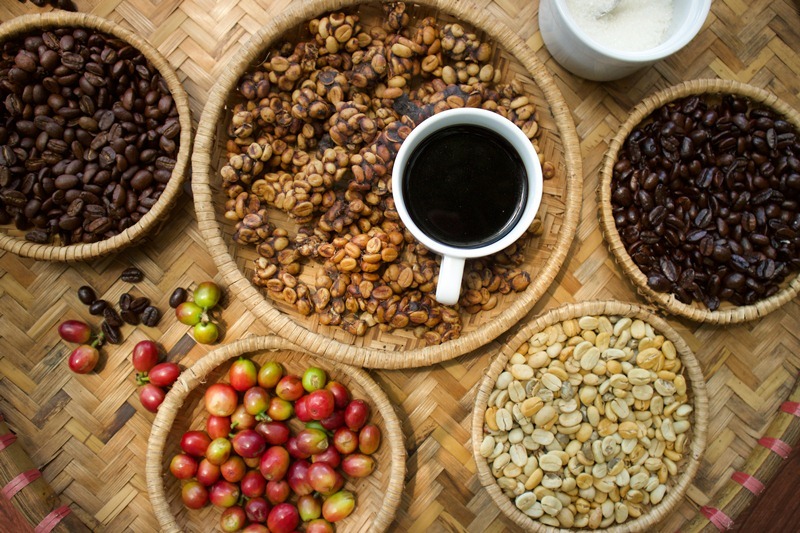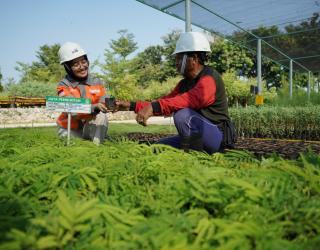Indulge your senses in the fascinating world of Luwak Coffee, where the remarkable combination of luxury and tradition unfolds in every sip. Renowned as the world's most expensive coffee, Luwak Coffee offers a truly unique and unforgettable experience for coffee connoisseurs and adventurers alike.
Discover the secret behind this exquisite brew as we delve into the journey of kopi luwak, from its humble origins in Southeast Asia to its status as a sought-after delicacy around the globe. This article explores the remarkable process by which these sought-after coffee beans are harvested, with a little help from the Asian palm civet, a small nocturnal mammal.
As you immerse yourself in the allure of Luwak Coffee, we will take you on a journey through the lush coffee plantations where the civets roam freely, selecting and digesting only the finest coffee cherries. Witness the meticulous process of collecting and sanitizing the beans before they undergo the complex roasting and brewing methods that result in a cup of coffee unlike any other.
Prepare to awaken your senses and embark on a one-of-a-kind coffee adventure as we unravel the secrets behind the exquisite aroma and remarkable flavors of Luwak Coffee. Join us as we explore the world of this captivating and rare brew that continues to captivate coffee enthusiasts the world over.
The unique process of Luwak Coffee production
The journey of Luwak Coffee begins in the lush, verdant landscapes of Southeast Asia, where the Asian palm civet, a small nocturnal mammal, plays a crucial role in the creation of this extraordinary brew. These agile creatures roam freely through the coffee plantations, selectively consuming only the ripest and most flavorful coffee cherries.As the civets digest the coffee cherries, a remarkable transformation takes place. The enzymes in the civet's digestive system break down the proteins and sugars in the coffee beans, resulting in a unique flavor profile that is unlike any other coffee. The partially digested beans are then excreted by the civet, and this is where the meticulous process of Luwak Coffee production begins.
The harvesting of Luwak Coffee beans is a delicate and labor-intensive process. Dedicated farmers meticulously collect the civet droppings, sorting through the terrain to locate the precious beans. Once collected, the beans undergo a thorough cleaning and sanitization process to remove any impurities or traces of the civet's digestive system. This step is crucial to ensure the safety and quality of the final product.
After the cleaning process, the beans are dried in the sun for several days, a process that helps to further enhance their unique flavor. The drying stage is followed by a careful roasting process, where the beans are roasted at specific temperatures and durations to bring out the full spectrum of their aroma and taste. The roasting process is a true art form, with experienced roasters meticulously adjusting the heat and duration to achieve the perfect balance of flavors.
The final step in the production of Luwak Coffee involves the meticulous brewing process. Baristas and coffee enthusiasts alike employ a range of techniques, from traditional hand-brewing methods to modern espresso machines, to extract the most flavorful and aromatic cup of Luwak Coffee. Each step in this intricate process is crucial in unlocking the exquisite taste and aroma that have made Luwak Coffee a global sensation.
The history and origins of Luwak Coffee
The origins of Luwak Coffee can be traced back to the Dutch colonial era in Indonesia, where the practice of coffee production was first introduced. As the Dutch colonists sought to cultivate coffee for export, they encountered a unique challenge – the local population, known as the Civet, had a particular fondness for the coffee cherries, often consuming them and excreting the partially digested beans.Intrigued by the distinct flavor profile of the civets' excrement, the Dutch colonists began to collect and process these beans, giving birth to the now-legendary Luwak Coffee. Initially, this practice was viewed as a way to salvage the coffee beans that had been consumed by the civets, but over time, it evolved into a highly sought-after delicacy, prized for its exceptional taste and aroma.
As the popularity of Luwak Coffee grew, the practice of civet coffee production spread to other parts of Southeast Asia, including the Philippines, Vietnam, and Malaysia. Each region developed its own unique methods and traditions, further enhancing the diversity and complexity of this remarkable coffee.
Today, Luwak Coffee continues to be produced primarily in Indonesia, with the majority of the world's supply coming from the islands of Java and Sumatra. The coffee plantations in these regions are home to thriving populations of Asian palm civets, which play a crucial role in the creation of this one-of-a-kind coffee.
The global demand for Luwak Coffee has soared in recent years, with coffee enthusiasts and connoisseurs around the world seeking out this rare and exclusive brew. As a result, the production and trade of Luwak Coffee have become highly regulated, with strict guidelines and certifications in place to ensure the quality and ethical sourcing of the beans.
Understanding the flavor profile of Luwak Coffee
The unique flavor profile of Luwak Coffee is the result of a remarkable interplay between the coffee cherries and the digestive system of the Asian palm civet. As the civet consumes the coffee cherries, the enzymes in its digestive tract break down the proteins and sugars, creating a complex and nuanced flavor profile that is unlike any other coffee.The most prominent characteristic of Luwak Coffee is its remarkably smooth and velvety texture. The partial digestion of the beans by the civet results in a reduction in bitterness and acidity, creating a remarkably smooth and well-balanced cup of coffee. This smoothness is often accompanied by a subtle sweetness, which can range from notes of caramel and chocolate to more delicate floral and fruity undertones.
One of the most captivating aspects of Luwak Coffee is its remarkable aroma. As the beans are roasted, the complex blend of compounds created during the digestive process is unlocked, releasing a captivating and intoxicating fragrance that can linger long after the last sip. The aroma of Luwak Coffee is often described as a harmonious blend of earthy, nutty, and sometimes even slightly musky notes, which can transport the drinker to the lush coffee plantations of Southeast Asia.
The flavor profile of Luwak Coffee is also characterized by its remarkable depth and complexity. The partial digestion of the beans by the civet introduces a range of unique flavors and textures that are not found in other coffee varieties. Depending on the region and the specific growing conditions, Luwak Coffee can exhibit a wide range of flavor notes, from rich, chocolatey undertones to delicate, floral accents.
Ultimately, the flavor profile of Luwak Coffee is a testament to the remarkable interplay between the natural world and the art of coffee production. The unique contribution of the Asian palm civet, combined with the meticulous care and attention of the coffee farmers, results in a truly exceptional and unforgettable coffee experience.
The controversy surrounding Luwak Coffee
While Luwak Coffee has gained a reputation as a rare and luxurious delicacy, it has also been the subject of significant controversy and ethical concerns. The practice of civet coffee production has come under scrutiny from animal welfare organizations and ethical consumers who are concerned about the potential mistreatment of the Asian palm civets involved in the process.One of the primary concerns surrounding Luwak Coffee is the potential for animal cruelty. In some cases, civet coffee production has been associated with the captivity and confinement of the civets, where they are forced to live in cramped and unsanitary conditions, with limited access to their natural habitats and diets. This practice not only raises ethical concerns but can also have a negative impact on the health and well-being of the civets, potentially compromising the quality and integrity of the coffee beans.
Another area of concern is the sustainability and environmental impact of Luwak Coffee production. As demand for this rare and exclusive brew has increased, the pressure on natural civet populations has also grown, leading to the potential over-harvesting of the beans and the disruption of fragile ecosystems. This has prompted calls for more sustainable and ethical practices in the production of Luwak Coffee, with a focus on preserving the natural habitats of the Asian palm civets and ensuring that their well-being is prioritized.
In response to these concerns, some producers of Luwak Coffee have implemented more ethical and sustainable practices, such as the use of free-range civets and the adoption of organic and fair-trade certification standards. These efforts have helped to address some of the ethical issues surrounding Luwak Coffee, but the controversy continues to linger, with many consumers still questioning the true cost of this rare and luxurious brew.
As the demand for Luwak Coffee continues to grow, it is essential that the industry as a whole takes steps to address the ethical and sustainability concerns that have been raised. This may involve greater transparency, stricter regulations, and a commitment to ensuring that the production of Luwak Coffee is carried out in a way that respects the well-being of the Asian palm civets and the fragile ecosystems in which they thrive.
Where to buy and try Luwak Coffee
As one of the world's most sought-after and exclusive coffee varieties, Luwak Coffee can be a challenging product to source and purchase. However, for those coffee enthusiasts who are determined to experience the exquisite flavors of this rare brew, there are a number of options available.The primary source for Luwak Coffee is Indonesia, where the majority of the world's supply is produced. Visitors to Indonesia can explore the lush coffee plantations and even witness the civet coffee production process firsthand, often with the opportunity to purchase the freshly roasted and brewed Luwak Coffee directly from the source.
For those who are unable to travel to Indonesia, there are a number of online retailers and specialty coffee shops that offer Luwak Coffee for purchase. These vendors often source their Luwak Coffee from reputable producers and cooperatives, ensuring that the beans are of the highest quality and that the production process adheres to ethical and sustainable practices.
When purchasing Luwak Coffee, it's important to be mindful of the price tag, as this rare and exclusive brew can be quite expensive, with some varieties costing hundreds of dollars per pound. However, for true coffee connoisseurs, the opportunity to savor the unique and captivating flavors of Luwak Coffee is often worth the investment.
In addition to purchasing Luwak Coffee for home brewing, many specialty coffee shops and cafes around the world offer Luwak Coffee as a premium and exclusive offering on their menus. These establishments often employ skilled baristas who are trained in the art of brewing Luwak Coffee, ensuring that each cup is prepared with the utmost care and attention to detail.
Regardless of where you choose to purchase or try Luwak Coffee, the experience is sure to be a memorable one. The unique and captivating flavors of this rare brew have the power to transport coffee enthusiasts to the lush coffee plantations of Southeast Asia, where the remarkable journey of Luwak Coffee first began.
Luwak Coffee alternatives for coffee enthusiasts
While Luwak Coffee is undoubtedly a unique and captivating brew, its rarity and high price tag can make it inaccessible for many coffee enthusiasts. Fortunately, there are a number of alternative coffee varieties that offer similar flavor profiles and unique characteristics, providing coffee lovers with the opportunity to explore the world of specialty coffee without breaking the bank.One such alternative is the Kona coffee, produced in the Kona region of Hawaii. Kona coffee is known for its smooth, well-balanced flavor profile, with notes of sweetness and a subtle acidity that can be reminiscent of Luwak Coffee. Unlike Luwak Coffee, Kona coffee is produced using traditional coffee cultivation and processing methods, making it a more accessible and affordable option for coffee enthusiasts.
Another alternative to Luwak Coffee is the Jamaica Blue Mountain coffee, renowned for its exceptional quality and unique flavor profile. This coffee is grown in the Blue Mountains of Jamaica, where the cool, high-altitude climate and rich soil create the perfect conditions for producing a smooth, well-balanced, and complex brew. While not as rare or expensive as Luwak Coffee, Jamaica Blue Mountain coffee is still considered a premium and sought-after variety among coffee connoisseurs.
For those who are interested in exploring the world of specialty coffee beyond Luwak and Kona, there are a number of other unique and intriguing varieties to consider. Ethiopian coffee, for example, is known for its vibrant, fruit-forward flavors and complex aroma, while Kenyan coffee is prized for its bright, balanced, and citrusy notes.
Regardless of which alternative coffee variety you choose to explore, the key is to approach it with the same level of curiosity and appreciation as you would with Luwak Coffee. Engage with the unique stories and production methods behind each coffee, and savor the nuanced flavors and aromas that make each variety so special. By doing so, you'll not only expand your coffee horizons but also deepen your understanding and appreciation for the art of specialty coffee.
Luwak Coffee and sustainability
As the demand for Luwak Coffee continues to grow, the issue of sustainability has become increasingly important. The production of this rare and exclusive brew has the potential to have a significant impact on the natural habitats and populations of the Asian palm civets, which play a crucial role in the creation of this one-of-a-kind coffee.One of the primary concerns surrounding the sustainability of Luwak Coffee is the potential for over-harvesting and the disruption of the civet's natural feeding patterns. As the demand for Luwak Coffee has increased, there have been reports of civet populations being captured and confined in order to produce larger quantities of the coveted beans. This practice not only raises ethical concerns but can also have a detrimental impact on the overall health and well-being of the civet population.
In response to these concerns, some Luwak Coffee producers have implemented more sustainable and ethical practices, such as the use of free-range civets and the adoption of organic and fair-trade certification standards. These efforts have helped to address some of the sustainability challenges associated with Luwak Coffee production, but there is still work to be done to ensure that the industry as a whole is operating in a responsible and environmentally-conscious manner.
Beyond the production process, the sustainability of Luwak Coffee also extends to the broader environmental impact of the coffee industry as a whole. The cultivation of coffee, regardless of the variety, can have a significant impact on local ecosystems, with the potential for deforestation, soil erosion, and water pollution. As such, it is important for coffee producers, including those who specialize in Luwak Coffee, to adopt sustainable farming practices that prioritize the preservation of natural habitats and the conservation of natural resources.
Ultimately, the future of Luwak Coffee and its sustainability will depend on the collective efforts of producers, consumers, and regulatory bodies to ensure that this rare and exclusive brew is produced and consumed in a responsible and ethical manner. By embracing sustainable practices and prioritizing the well-being of the Asian palm civet, the coffee industry can help to ensure that the unique and captivating flavors of Luwak Coffee can be enjoyed for generations to come.
Exploring the cultural significance of Luwak Coffee
Beyond its status as a rare and exclusive delicacy, Luwak Coffee holds a deep cultural significance in the regions where it is produced, particularly in Indonesia. The practice of civet coffee production has been a part of the cultural fabric of these communities for centuries, and the coffee itself has become a symbol of tradition, artistry, and connection to the natural world.In many parts of Indonesia, the collection and processing of Luwak Coffee beans are deeply intertwined with the livelihoods and cultural identities of the local communities. The Asian palm civet, the creature responsible for the unique flavor profile of Luwak Coffee, is revered in these regions as a sacred and respected animal, with its presence in the coffee plantations seen as a sign of the land's fertility and abundance.
The production of Luwak Coffee is also imbued with a sense of ritual and ceremony, with the harvesting, cleaning, and roasting of the beans carried out with great care and attention to detail. The skilled coffee farmers who oversee this process are often regarded as artisans and custodians of a centuries-old tradition, their knowledge and expertise passed down through generations.
Beyond its cultural significance within the producing regions, Luwak Coffee has also become a symbol of luxury and exclusivity on a global scale. The high price tag and limited availability of this rare brew have made it a coveted commodity among coffee connoisseurs and those seeking to experience the pinnacle of coffee culture. In this way, Luwak Coffee has become a reflection of the growing appreciation for specialty and premium coffee products, as well as a testament to the enduring allure of the exotic and the rare.
As the demand for Luwak Coffee continues to grow, it is essential that the cultural significance and traditional practices associated with its production are preserved and celebrated. By recognizing the deep-rooted connections between Luwak Coffee and the communities that have cultivated it for generations, we can help to ensure that this remarkable brew continues to be a source of pride, tradition, and cultural identity for years to come.
Luwak Coffee: A Captivating Blend of Nature and Craftsmanship
The captivating journey of Luwak Coffee is a testament to the remarkable interplay between the natural world and the art of coffee production. From the lush coffee plantations of Southeast Asia to the cups of discerning coffee enthusiasts around the world, this rare and exclusive brew has captured the imagination of coffee lovers and connoisseurs alike.The unique process by which Luwak Coffee is produced, with the Asian palm civet playing a crucial role, is a true marvel of nature. The meticulous care and attention to detail that go into harvesting, cleaning, roasting, and brewing these precious beans are a reflection of the dedication and expertise of the coffee producers who have mastered this art form.
While Luwak Coffee has faced its share of controversy and ethical concerns, the industry has made strides in addressing these issues and implementing more sustainable and responsible practices. By prioritizing the well-being of the Asian palm civet and the preservation of the natural habitats in which they thrive, the producers of Luwak Coffee can help to ensure that this rare and captivating brew can be enjoyed for generations to come.
For coffee enthusiasts, the opportunity to experience the exquisite aroma and unique flavor profile
Editor : Redaksi








